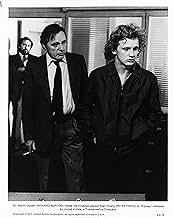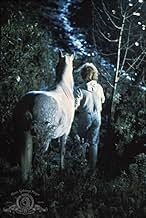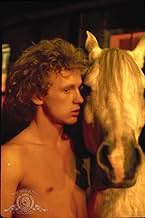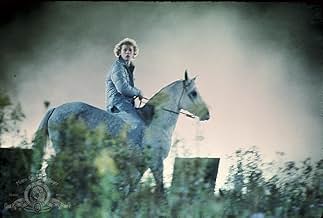A psychiatrist attempts to uncover a troubled stable boy's disturbing obsession with horses.A psychiatrist attempts to uncover a troubled stable boy's disturbing obsession with horses.A psychiatrist attempts to uncover a troubled stable boy's disturbing obsession with horses.
- Nominated for 3 Oscars
- 5 wins & 7 nominations total
- 2nd Child
- (uncredited)
- Dr. Bennett
- (uncredited)
- Mr. Davies
- (uncredited)
- Ringmaster
- (uncredited)
- Mary
- (uncredited)
Featured reviews
Sidney Lumet adds this version of Peter Schaffer's play to his list of memorable theatrical adaptations while Richard Burton earns his reputation breaching the third wall to provide the glue that holds the film together and was duly rewarded with several awards (including an Oscar nomination).
The orange-tinted scene in the barn where Jenny Agutter slips out of her jodhpurs and on to her back provides an unexpected thrill unfortunately blighted (SPOILER COMING:) by the truly shocking sight that immediately follows.
And it is here where Lumet's genius comes in. If there is one thing that Lumet has a feel for, it is the gritty, down-to-earth feel of everyday life. While this usually means New York life, he does a marvelous job in this film of capturing the drab sterility of Dysart's world, as well as that of the Strang home. When these are compared to the vivid, almost ethereal shots of Alan in the stables or with the horses on the field (also, compare the striking image of horse and rider on the beach with the remainder of the beachgoers), we can fully understand Dysart's frustration about "looking at pages of centaurs trampling the soil of Argos" while Alan "is trying to become one in a Hampshire field". Alan has found a way to completely escape the drabness of his world, while Dysart has become sterile trying to find ways not remind himself of it. Similarly, the tight perimeter of the stage play has been replaced by tight focused shots which, more often than not, achieve the same result through a claustrophobic effect.
Likewise, the absence of theatrical staging does nothing to dampen the power of Shaffer's text, which remains as potent as ever. Indeed, what's often overlooked about this play is that, while the visual images of the staging are striking, they are, in most instances, completely detached from the central thrust of the text, both as a mystery and as a commentary on the consequences of society's demand for "normality" at any cost.
In this regard, the performances are outstanding. Richard Burton gives one of his last great performances as Dysart, showing us the literally crumbling facade of the doctor's spirit, while at the same time giving us a complete character (contrast his cynicism throughout with the moments of tenderness, such as those shown to Alan's mother and to Alan himself after the final session). Likewise, Peter Firth presents us with a cipher, wrapped up in television jingles, who is revealed to us piece by piece through moments of vulnerability until we see in full force what has made his character commit these horrible crimes. The rest of the cast -- notably Joan Plowright, Colin Blakely and Jenny Agutter -- do wonders with the limited dialogue they have to work with.
Put simply, Equus is an astonishing film to watch, provided that you're ready to watch it as a film, rather than as a filmed stage play. For those who hold to the notion that only the stage devices can make this play work, I'd advise them not to watch any film adapted from a play, as they'll almost certainly be disappointed every time.
Both Peter Firth and Richard Burton give a lesson on acting that every 20 million hollywood superstar should pay atention too. So, if you want some entertaiment that have a warm feeling and makes feel you good, go see Pirates of the Caribean. Equus has the power to disturb and transfixate its audience, this is truly an art film.
Equus, is my best Lummet film I have seen so far - I always had a tendency to take interest on and see subtext in extreme, weird, negative situations on film. You have much to take from negative stuff, if they're handled properly. Here, there are so much stated for the viewer to think. Questions on the point of psychotherapy, on the nature of perversion (and its possible causes), importance of religion combined with lack of knowledge, isolation, lust for life and so much more I don't want to refer to here.
Beware! The film features strong material - both visuals and texts - this is no easy film for Hollywood audience. But its not uneasy in a way that it's slow, or 'arty' or anything. Far from that, it's original, deeply involving, with gripping atmosphere... Its subject matter though, might force the more coward or less open-minded viewers to trash it or mock it, for fear of what it could unleash or because they simply couldn't understand it. But intelligent film lovers, take a little tolerance and SEE this. It is worth the search. This is film is a masterpiece of film-making!
Did you know
- TriviaRichard Burton, who was suffering from back pain and pinched nerves, recorded his eight monologues in one day.
- GoofsSome of the horses blinded in the final scene in the stable are obviously just puppets.
- Quotes
Martin Dysart: Moments snap together like magnets forged in a chain of shackles. Why? I can trace them, I can even with time pull them apart again. But why at the start were they ever magnetized at all. Why those particular moments of experience and no others, I do not know! And nor does ANY BODY ELSE! And if *I* don't know, if I can *never* know, what am I doing here? I don't mean clinically doing, or socially doing, but fundamentally. These whys, these questions, are fundamental. Yet they have no place in a consulting room. So then do I? Do any of us?
- Alternate versionsWhen released theatrically in Ontario, Canada. The Ontario board of Censors made cuts to horses getting blinded for a 'Restricted' rating.
- ConnectionsFeatured in The 35th Annual Golden Globe Awards (1978)
- How long is Equus?Powered by Alexa
Details
Box office
- Budget
- $4,000,000 (estimated)
Contribute to this page
































